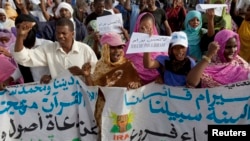A wave of arrests in Mauritania have landed anti-slavery activists behind bars.
Authorities arrested at least nine activists between June 29 and July 3 and denied them access to their families and lawyers, according to Amnesty International.
The activists are part of the Initiative for Resurgent Abolition Movement (IRA), one of the main organizations that have shone a spotlight on the persistence of slavery in Mauritania.
They were arrested following a protest against the forced removal of a group of about 20 Mauritanians who had been living in a shantytown on the outskirts of the capital, Nouakchott, and were relocated by security forces to a more remote area. The protests over relocation became violent and resulted in injuries to demonstrators and members of the security force and damage to property.
The government hasn’t officially responded, and the Mauritanian Embassy in Washington didn’t respond to VOA’s request for comment on the arrests. However, one of the governors of Mauritania’s capital, Mahy Ould Ahmed, said the IRA arrests were “provoked by a movement known for its extremism,” according to Reuters.
The people removed are of a darker-skinned ethnic group who have historically been discriminated against in the country, according to Sadibou Marong, Amnesty International's West Africa press officer.
Marong said the land was private and did not belong to those who were living there, but unconfirmed reports said Mauritanian officials were trying to clean up the capital in advance of hosting an Arab League summit this month.
He said the jailed activists have been held incommunicado, and "even the family members don’t know" where they are. “We are calling for the government of Mauritania to free them."
Marong said the anti-slavery activists are being targeted as troublemakers by security forces, even though they are only exercising constitutionally protected rights of freedom of expression and association. The longtime repression of these people "has started to really become violent ... and we are calling on the Mauritanian government to stop that.”
Awarded in U.S.
The IRA's president, Biram Dah Abeid, and vice president, Brahim Bilal Ramdane, who were not among those arrested, were recently invited to Washington by the U.S. State Department. They were awarded the Trafficking in Persons Heroes Award on June 30, 2016.
Biram Dah Abeid has been arrested several times in the past for fighting slavery. He told his story from Aleg prison in Mauritania last year, saying: “In the past five years, I have been imprisoned three times. I have been locked up during key events of my adult life, including the birth of my daughter. I celebrated my 50th birthday behind bars on 12 January 2015.”
Siikam Sy, a member of the board of directors of IRA-USA, said he is concerned for the safety of the activists. He said Mauritania’s heavy-handed approach is counterproductive to addressing the issue of modern slavery.
“The government is making a huge mistake by aiming or seeking to basically decapitate IRA-Mauritania, when in fact what it should have done is look at IRA-Mauritania as a partner in ending slavery,” he said. “We continue to demonstrate, and each one of those demonstrations is met with unbelievable violence from the police. We will continue because we think this is a human rights issue.”
He pointed out that although the organization is recognized and supported around the world, it is not recognized in Mauritania itself.
“The fact is that you can still buy and sell human beings in Mauritania, and this is backed by facts on the ground,” he said. “On one side you have a government that denies, denies, denies, and on the other side you have the IRA that will continue to push so that the government could take tangible steps toward eradicating, eliminating the practice of slavery in Mauritania.”




